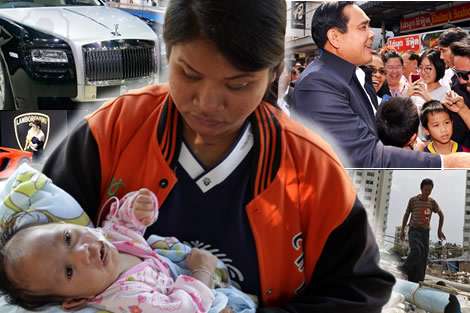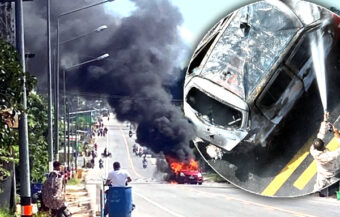Thailand was, questionably, labelled by a Swiss bank as top of World’s economic inequality charts this week – it does not reflect the real story, the picture on the ground or the desired way forward
This week’s’ revelation that Thailand has been quoted as the country with the highest level of inequality by a report fashioned by a Swiss bank, which was convicted, in 2014, of helping wealthy Americans evade tax, should be looked at carefully. There is no doubt that Thailand has an inequality problem but it also has the the lowest rate of unemployment in the world. It is the 2nd in the world for female CEOs and has a very low burden of personal taxation. There is dramatically less government intrusion and regulation of people’s lives. It also has a government that is working on tackling the country’s problems solely for the benefit of the Thai people and surprisingly, a state apparatus that has dramatically reduced levels of poverty, consistently for the last 30 years. At this decisive point in its development, it is crucial that Thai policy makers do not uncritically follow western orthodoxy. As events this weekend show in Paris and France, it is not always the ideal option.
A Swiss bank this week claimed that Thailand was the most unequal country in the world on economic terms. The report and claim by Credit Suisse, one contained in that company’s Global Wealth Databook for 2019, should be treated cautiously is there is much in the western world and western analysis that does not understand everything about Thailand and the Thai economy. For a start, over 60% of the Thai economy is still off the government’s books. This makes all statistics about Thailand dubious. This casual economy, however, is a boon for many who are employed within it, and helps to keep consumer prices low. Thailand is a huge agricultural producer and a country where many people own the land. Thailand also has the accolade of having the lowest unemployment rate in the world, which fell again to under 1% in the last quarter of 2018.
Thailand’s laissez faire economy, with less than 1% unemployment, has a substantial upside

This does not imply that the country does not have an inequality issue but there are some arguments that observers should look more closely and be more critical of when trotting out the western economic model and data. We are witnessing a period of increased revolt in western countries where the burden of high taxation and income redistribution policies are making life virtually impossible for the real working class, who do not receive state supports. There is some argument that Thailand’s laissez faire approach may have indirect benefits.
Credit Suisse pleaded guilty to assisting high net worth Americans to evade tax in 2014
The report quoted this week from Credit Suisse, a company that pleaded guilty in 2014 to assisting wealthy Americans to conceal $4 billion in assets and who only this September was fined $10 million by the US Securities and Exchange Commission, should be looked at critically. It highlights that 1% of the richest people in Thailand own 58% of the country’s wealth two years ago and that this figure has surged to 66.9% this year. This does seem like a large movement but it may reflect a perfect storm for Thailand’s elite, with rising property prices, cash profits and consumer sentiment. There is no doubt that Thailand is now home to some of the richest families and private companies in the world. Some of these are huge conglomerates and international success stories. This has actually many positive effects. For one, these companies are powerful enough to act decisively to assist government policy when requested and many of the business leaders at the helm of these companies are well educated and proven players.
Thailand’s large family owned businesses are an asset to the country and drive prosperity
Again the comparisons with the growing business model in the West should be looked at. Many elder, western business leaders for the last 40 years have been highly critical of the modern leadership of western corporations, which are publicly owned and many of which now have virtual monopolies in this global world. The fact is that the management of these companies have somehow become less beholden to shareholders. They are also more likely to be influenced by political correctness and group think. The growing confidence of Thai business leaders can be seen in the outright purchase of the influential and international Fortune magazine by Chatchaval Jiaravanon recently. The scion of a leading Thai business family bought the universally well known publication for $150 million in November this year. The magazine was bought outright as a going concern and Mr. Jiaravanon, who is US educated, plans to make it the nucleus of a new international business news network online.
Women in Thailand have more opportunity than in western countries with many in business
The reasons why the figures for Thailand on inequality appear at the top of the scale surely must include the absence of a fully fledged social welfare system. This is linked to the unrivaled low unemployment rate and the freedom afforded to the small business sector to work to their own devices. It is also a matter of culture. Thailand has also, in recent surveys, come out on top as a country where business people are more respected just behind Russia. It is also this environment that sees Thailand faring very well, without outside interference or feminist politics, when it comes to employments rates for women in the country. Thai companies have the 2nd highest rate in the world for female CEOs while up to 75% of small traders in Thailand are women. The data being extrapolated does not quite reflect positive things on the ground.
It’s time to question the IMF, United Nations and their ideological economic way forward
For any visitor to Thailand, the first thing you will notice is the level of small business activity on every street and beside every road. The Credit Suisse document pointed out that no country in the world has over 50% of the wealth controlled by 1% as it claimed Thailand does. It would be interesting to look at the percentage of GDP in some western countries controlled by public listed companies and government expenditure combined. It is time to question the western model that is being promoted by economists working and beholden to world bodies such as the IMF, United Nations and to a lesser extent the World Bank, which to be fair, has a more pragmatic approach.
Thailand’s biggest problem is now the lower birth rate caused by UN policies not inequality
One of the biggest issues facing Thailand, at present, is the demographic crisis which is limiting potential economic progress and presenting some serious social challenges. This is linked to a UN programme to control population which in hindsight, seems to have been an unprecedented blunder impacting nearly all countries in Asia with the same problem. Modern strife in Western countries, in this instance caused by social changes, but also linked to birth control, is generating huge problems society.
Life in Thailand is less regulated and more free while 50% of UK people account for only 9% of the wealth
All that said, Thailand does have a serious inequality problem. The Thai government has made it a top priority in all its current programmes. The Credit Suisse report pointed out that 10% of the poorest people in Thailand have no wealth at all and that 50% of the poorest Thai people had only 1.7% of the wealth. To put this in perspective, figures from 2012 to 2016 in the United Kingdom consistently show that 50% of the poorest people in that realm have only 9% of the wealth. To put this in even deeper perspective, the question is how do you compare being poor in Thailand to being poor in a country with a comprehensive social welfare system, higher employment barriers and government intrusions into the personal sphere as well as regulation. It is far more likely, given the low unemployment rate in Thailand, that poorer Thai people will be working and may perhaps have more dignity in a society which also offers perhaps more day to day opportunity because of less regulation.
Compare living in Thailand with the United Kingdom
It is also the case that the cost of living in Thailand is appreciably lower. Consumer prices are 30% lower, rent prices are 40% lower and restaurant prices are 70% lower. Factor into this the fact that 28% of Thai people own land at approximately 16 million property holders and this compares relatively favorably to the 17.5 million people in the UK who own houses except that Thai people are less likely to have mortgages. Now for the kickers. Thailand has a very low VAT rate. The average price for a litre of petrol in Thailand is £0.65 compared to £1.25 in the UK. But the real difference is the tax paid by workers to the government. Only 6% of Thai workers pay any income tax at all. The big negative is the low level of Thai salaries with the average salary being ฿19,200 per month or £465 compared to ฿75,200 or £1,800 in the UK. However property prices, although rising in Thailand, are approximately half those in the UK outside of Bangkok and key urban centres. While Thai people pay higher interest rates on loans or mortgages at 5.6% compared to 3.2% in the UK, the average repayments in Thailand are far lower. In addition, Thailand is more family centred and child care costs are negligible if anything at all. Also now consider that Thailand is a country that retains its distinct culture, sense of identity and critically important, ownership. It may occur to people that there is another way for economic development.
Many western countries, like Thailand, have nationals with no wealth but Thai people have family
The survey by Credit Suisse highlighted that Belgium and Australia have very low inequality scores at just over 20% and 22% respectively. It also highlighted that 10% of Thai people have no wealth at all. However, a March 2018 survey in the UK found that 25% of people in that country had no savings. We have already established that a significant majority of UK nationals do not own their own property. This leads to the consideration of whether a society should guarantee more equal outcomes as opposed to opportunity or what is the correct balance. Belgium is not a particularly happy or strife free country while Australia is not without its own social challenges. Certainly the United Kingdom is not. A key facet of life in Thailand is a strong sense of community and care within extended families, which old fashioned traditions preserve. This has a real economic impact and is certainly the key to survival and comfort for the 10% without wealth.
Thailand 4.0 and its impact on Thai farming will be a big step forward in fighting inequality
The Thai government launched Thailand 4.0 in 2016. It is an 20 year economic development programme. This aims to transform Thailand into a higher income economy. The plan is not a gimmick, as some opposition figures and media reports branded it at the beginning. The plan is already being implemented by social partners with new statutory agencies, initiatives and funding. The driving forces include the Thai government, businesses including private and international concerns and the education sector. The plan is to bring data usage and advanced technology to every sector in the economy and in particular into farming to increase crop yields and planning. A whopping 40% of Thai people still work in agriculture. It is the underlying factor behind the inequality statistics. The average Thai farmer earns only $84 per month or ฿2,700 and survives only through the land and the support of the extended community. Transforming this sector will have a huge impact on inequality in Thailand.
Tourism is playing and will play a bigger, vital new role in addressing inequality in Thailand
When launched first, the Thailand 4.0 programme aimed to wean Thailand off its dependence on the tourist sector. However in the last few years, Tourism in Thailand has leaped forward again, with the government now targeting a $100 billion industry. Tourism revenue, it has been found, goes directly into communities in Thailand and is a major positive for fighting inequality. Now Thailand’s tourism bosses are promoting farm tourism as part of the country’s tourist offerings. The tourist sector success has been achieved with brilliant marketing but also through opening up ports and flight gateways to all Thailand’s regions. A significant objective of the Thai government is to redirect tourism to secondary or poorer regional areas. The internet and self booking has transformed this activity. This has the twin benefits of dealing with concerns expressed by the World Bank on excess tourism, which the authorities are also robustly tackling. However, the key benefit will be to bring more income directly into poorer agricultural areas.
Thailand must adapt to competition from economies with younger populations with higher incomes
The over arching goal of Thailand 4.0 is to make Bangkok and Thailand a technological centre for the internet and technological industries generating substantial worldwide income, exports and driving a new level of earnings for Thai workers. The Thai government is also using data and technology to take the state’s administrative functions more transparent and to eliminate waste and corruption. In this way, it is hoped that Thailand can avoid the income trap and economic problems presented by its ageing population. Thailand currently finds it more difficult to compete for investment with other Asian economies, who have younger populations, such as the Philippines, in traditional industrial activities.
Thailand must question the orthodoxy of wealth distribution policies as the way forward
The solution being advanced by international organisations to Thai authorities is to increase old fashioned wealth distribution efforts, which invariably involve a bigger role for the state, the reduction of small business holdings and more alignment with international standards. This is what has happened in western economies. It is time, to at least question that route. Thai people have a unique society and approach to doing things. One key value in Thailand is personal freedom and this explains the country’s journey to date. The Credit Suisse report suggests that 70% of Thai people only account for 5% of the nation’s wealth. This is changing as the Thai economy grows and the Thailand 4.0 programme will decisively impact this. However, the huge value of privately held wealth by Thai companies and richer families does not, in long term, necessarily, work to the detriment of the Thai economy.
Thailand has made huge and impressive progress in reducing poverty in the last 30 years
Thailand’s influential National Economic and Social Development Board, which only last week called on the Thai government to incentivise Thai people to produce more children, has questioned the Credit Suisse report or at least the negative impression that it may infer. The Board points to a narrowing of inequality in Thailand. This has been the thinking with more younger Thais on higher salaries and purchasing new properties in the last decade. Thailand’s poverty rate has dropped from a whopping 44% in 1988 to 7% this year all through government policies and the economic development of the country.
Thai government has plans to radically tackle income inequality and is acting on them
The NESD Board points to a World Bank model which takes the wealth of any nation and distributes it into an indice coefficient. This tells another story. This is known as the Gini index. It shows the gap between Thai incomes dropping from a figure of 0.499 in 2007 to 0.453 in 2017. It must be accepted that this change is minimal however. The plan of the Thai government is more radical. Its intentions have been made been clear since 2016 to address inequality in Thailand. Among initiatives has been a drive to root out illegal money lending which aggravates the situation.
Thailand should look to the U.S. model as opposed to European while finding its own way
The goal of the Thai government is to reduce the disparity in income between the richest 10% in Thailand and the lowest 10% to a factor of 15 by 2037. There is no doubt that addressing income equality must be a key goal for Thailand in the years ahead. The biggest threat to the country has been and will continue to be political instability. The key is to avoid making the mistake that some European economies have made in the past and that would be to create an economy too dependent on big government and lacking dynamism. The latest news from Europe with rioting in France and Belgium shows the danger of too much government intervention and taxes as well as the lack of it. Thailand has, in the past, on many policy matters followed a mixture of US and European approaches. In this respect, the US economic way may be best but for a country with its own unique way of doing things, it probably calls for a Thai way.


















